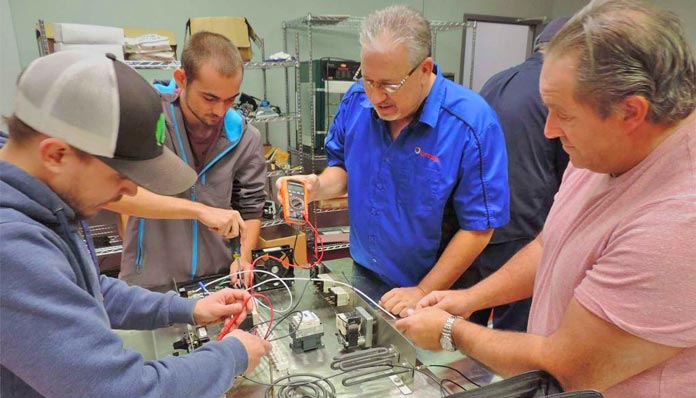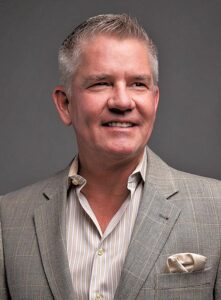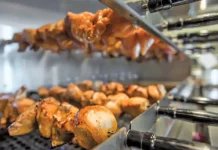
Baby boomer technicians, age 57-75, have already begun to retire creating even more of a need in a field where young people may have not been interested in the past in using their hands or being mechanically inclined.
According to Kirby Mallon, the Owner and President of Elmer Schultz Services, a third-generation, family owned business, and President of the Commercial Food Equipment Service Association (CFESA), the pandemic has shifted this thinking with young people, finding less value in college, actually gravitating to satisfying work as technicians. Not only do they get immediate gratification when they can solve a problem and become heroes to a restaurant they get up and running again, but an experienced food equipment technician can have a salary well over six figures.
Headquartered in Philadelphia since 1950, Elmer Schultz provides service, parts and installation for commercial cooking and refrigeration equipment. The $5+ million small business has 30 employees in Philadelphia, Pleasantville, NJ and Wilmington, DE and works with household names both nationally and locally from Stephen Starr to Michael Solomonov, from Greg Vernick to the Mignuccis from DiBruno Bros. The company was on the cusp of celebrating its 70th anniversary last April when the pandemic hit and decimated the industry.

Kirby and his family have always adopted an employee-first mindset and culture and made some tremendous adjustments to help ensure not a single employee was laid off or left without healthcare over the past year. While not leaving a single restaurateur behind, they pivoted during massive closures to servicing more nursing homes, hospitals and grocery stores. They restructured internal roles and processes and dramatically reduced expenses. Kirby was quick on his feet to safeguard the future of the business and his team.
Kirby is working diligently to get the word out about the vast need in the industry for these roles which will only continue to grow exponentially as the hospitality industry recovers and thrives.
He shares his views with us about the path forward in working with CFESA to ensure a profitable, lifelong career with the job security so many are looking for today.
The restaurant industry has been decimated in 2020, but we’re going to have the roaring 20’s – how do you train employees so they’re ready for the industry on the other side?
While the industry has been hard hit this past year, I always look for the silver lining. The upside is that people are starving more than ever for human connection. What a better place to celebrate together than over a meal in your favorite restaurant? I for one, cannot wait for that and I believe as vaccines continue to roll out, many of us will flock back to our favorite restaurants to support those businesses again. As for employees that undergo CFESA training, it’s incredible what the program offers. At the minimum, the CFESA company is making a $25,000 (sometimes upwards of $75,000) investment in the employee’s education. We have an incredibly robust training program that is equal parts educational, tactical and experiential to ensure all technicians are entering the workplace equipped to succeed. Our technicians love the industry as much as I do and I know many of them are eager for the upswing that lies ahead.
In what ways, if any, has the service agent side of the industry changed over the past year?
I think we’ve all gotten leaner, which has been a silver lining of this situation. We took lemons and made lemonade. Many of us got the right people on the bus in the right seats. In the downtimes, we’ve reinvested in training and technology, we’ve gotten better at analyzing inventory, and we’ve improved our work spaces.
Of changes that have already been put in place, which do you see as being more temporary and which do you feel may be fundamental, long-term changes?
As a business owner, I always thought we all need to be in the same room at the same time to be on the same page. Not so, working remotely while constantly communicating is surprisingly effective and efficient. For our customers, the plexiglass will thankfully come down, but I am so impressed with the hygienic improvements that have been made within kitchens and their staff and I hope they remain the new standard.
What do you see as the biggest areas of untapped opportunity for this industry?
CFESA service companies need to pivot and find new sources of revenue within our industry. For example, further outreach to essential operations including hospitals, grocery stores and nursing homes that have commercial cooking equipment. I want to be clear this does not mean turning our back on restaurants whom we continue to support in every way possible.
Our technicians are also a huge source of opportunity. As the face of our industry, they are in direct communication with our customers and we need to listen to our customers to satisfy their ever-changing needs.
How can someone entirely new to this industry break in?
Go to cfesa.com/directory and apply to local service companies. All service companies are looking for quality candidates to hire and train. A basic understanding of how to use tools, maybe a little understanding of electric and a good attitude will get you hired. You will be paid to learn the little unknown and secure the highly coveted job of a CFESA Certified Technician.
What should they expect during training?
Expect to be vetted by a seasoned CFESA Master Technician Trainer who will first make sure they are engaged, focused and willing to learn every day. All of our technicians are rock stars who add value daily. The Monday morning blues will be a one-way ticket home. Trainees will quickly be evaluated on how they interact with the customers – believe me, this can be 50% of the job. After six months of hands-on, real-life training, the trainee will be sent to the CFESA World Headquarters and Global Training Facility in Fort Mill, SC for a weeklong intensive training course covering the basic principles of electric, gas, steam and water, known as the EGSW class. Once the trainee completes this course, they would be ready for entry-level tasks such as planned maintenance or replacing parts troubleshot by more experienced technicians. Before they know it, they feel confident and are ready go out on their own.
What does the process and trajectory look like from training to field technician?
From the day hired to the day they are out on their own can be anywhere from 6-8 months. Field training and classroom training for roughly six months followed by CFESA testing in electric, gas, steam and/or refrigeration for the next few years. The trajectory to CFESA Master Certification takes about four years. (The same amount of time one would spend at college – without compensation, and possibly incurring debt.) An experienced CFESA Master Certified Technician earns six figures and can typically move to anywhere in the country and get a job immediately.
What advice do you give to new technicians?
Stay the course. Don’t panic and take this time to reevaluate all of your processes and procedures. If you hear “that is how we have always done it,” figure out the better way. Also, relationships have proven to be invaluable during this difficult and trying time. Over-communicate – it can only serve you and your team to learn how others are problem solving. Make plans now so that your company is ready for the boom to come in the next few months.
How important is mentorship in your field and how do you cultivate a culture of continuous learning?
Mentorship is crucial for the success of a technician, and on a larger scale, the overall growth of the company. We create clear and open lines of communication, establish regular one-on-one meetings between employees and supervisors, and try to create as many opportunities as possible for less experienced technicians to work side-by-side with industry veterans so they can glean lessons and experience in the field firsthand.























